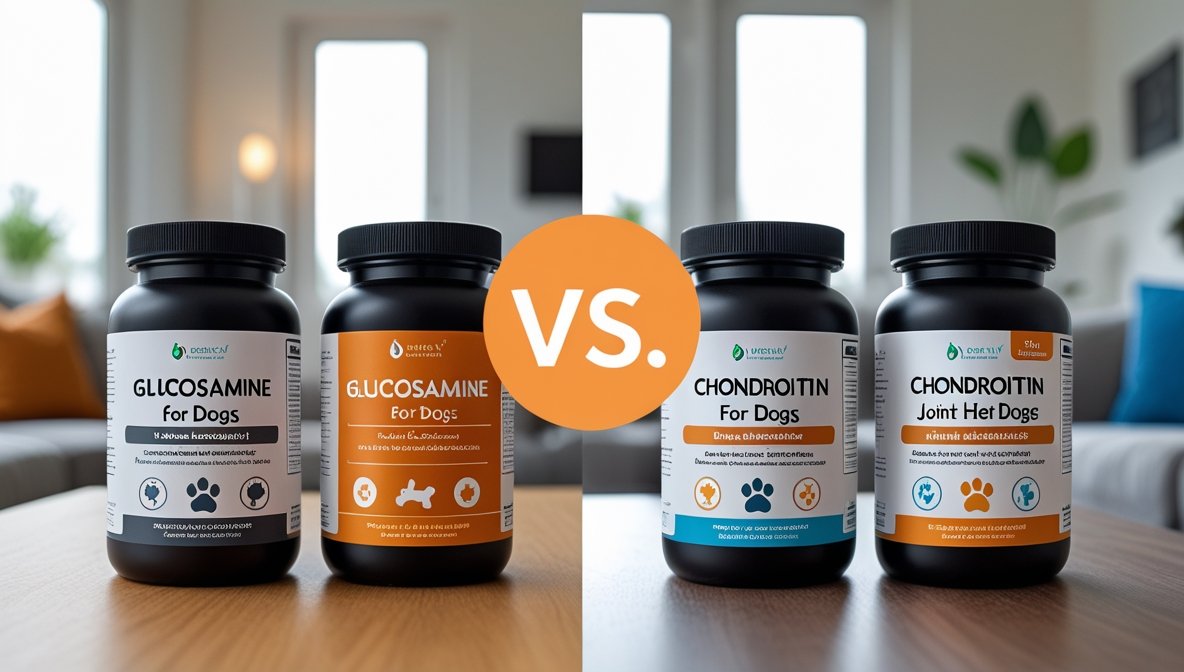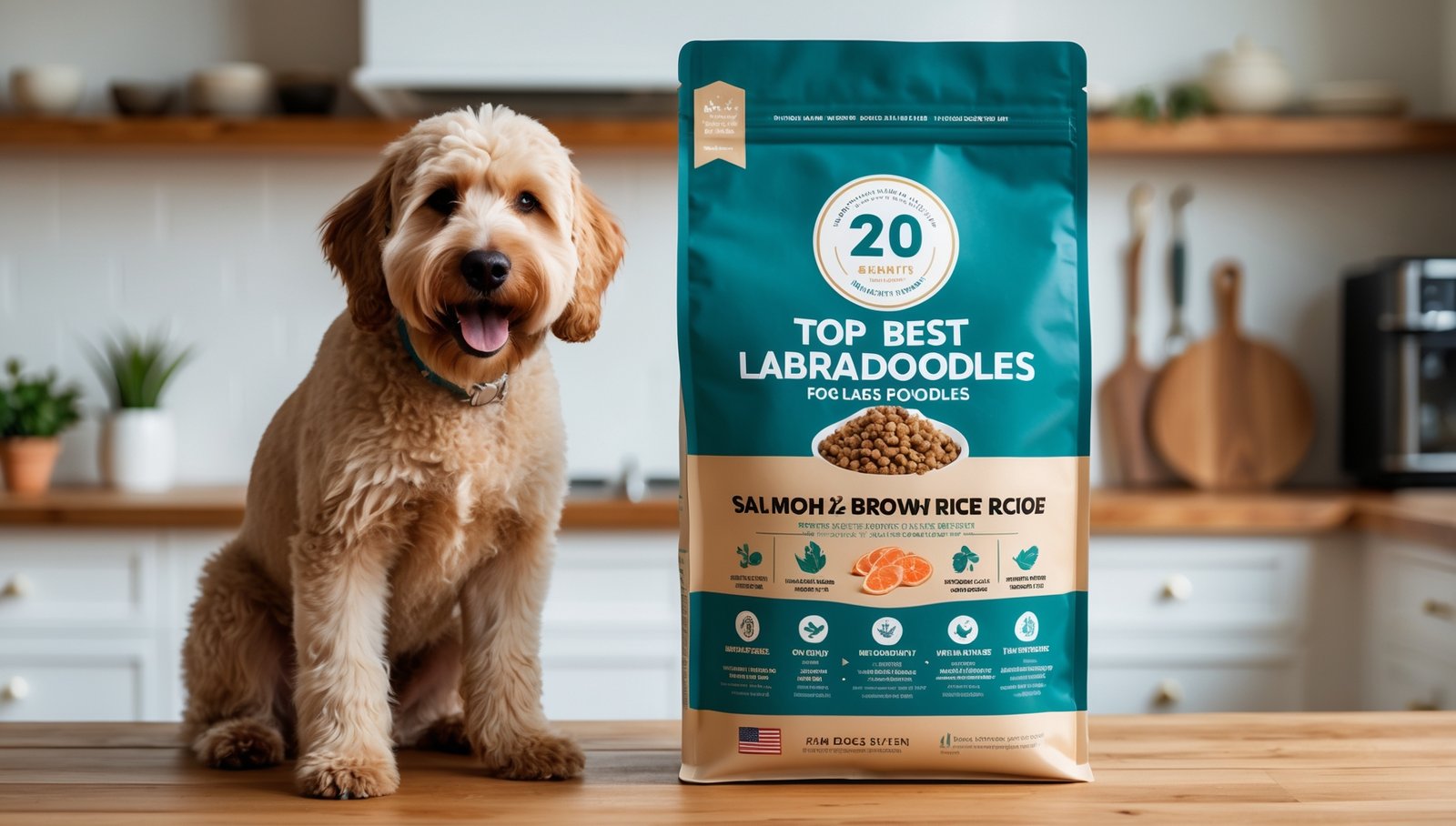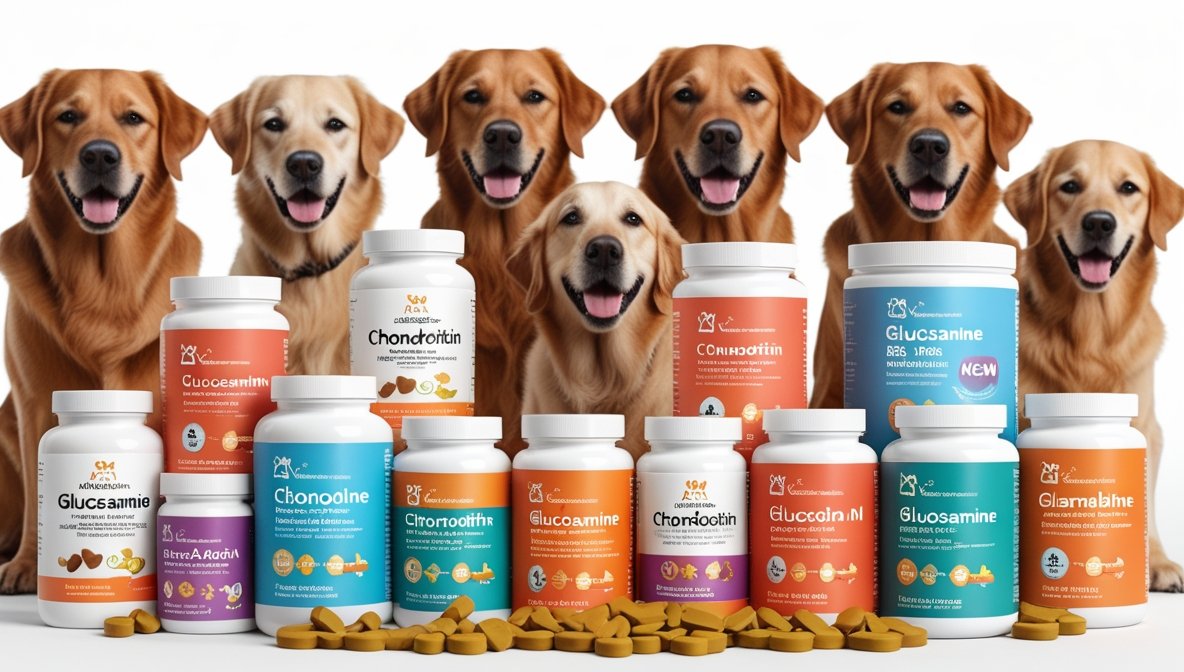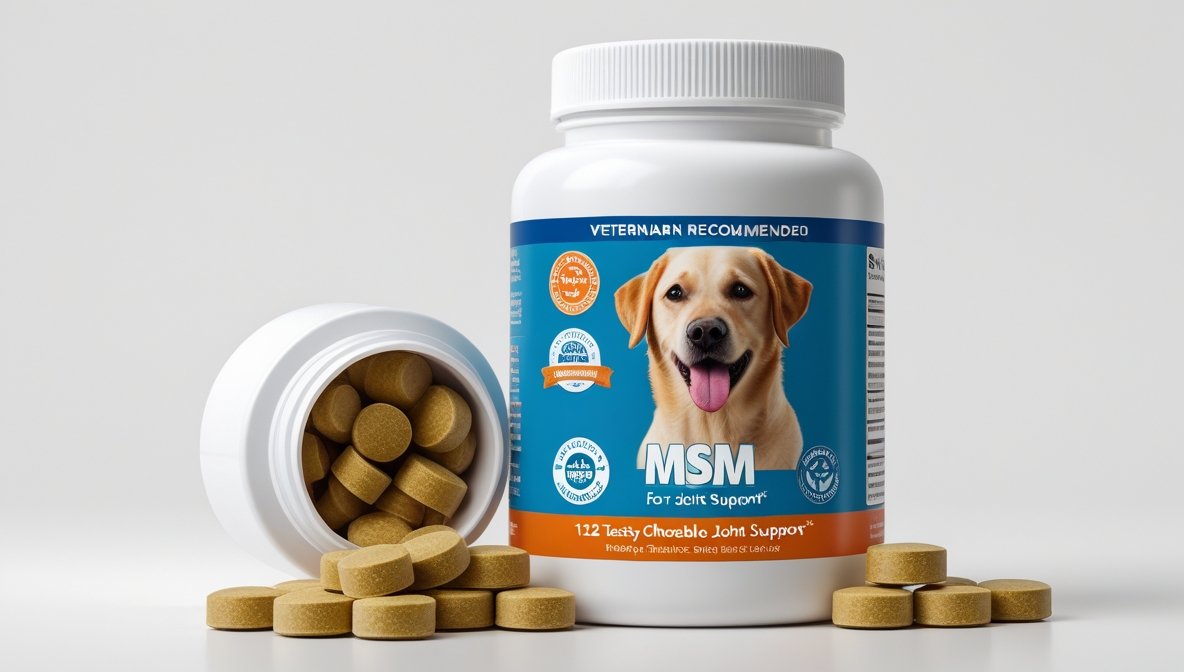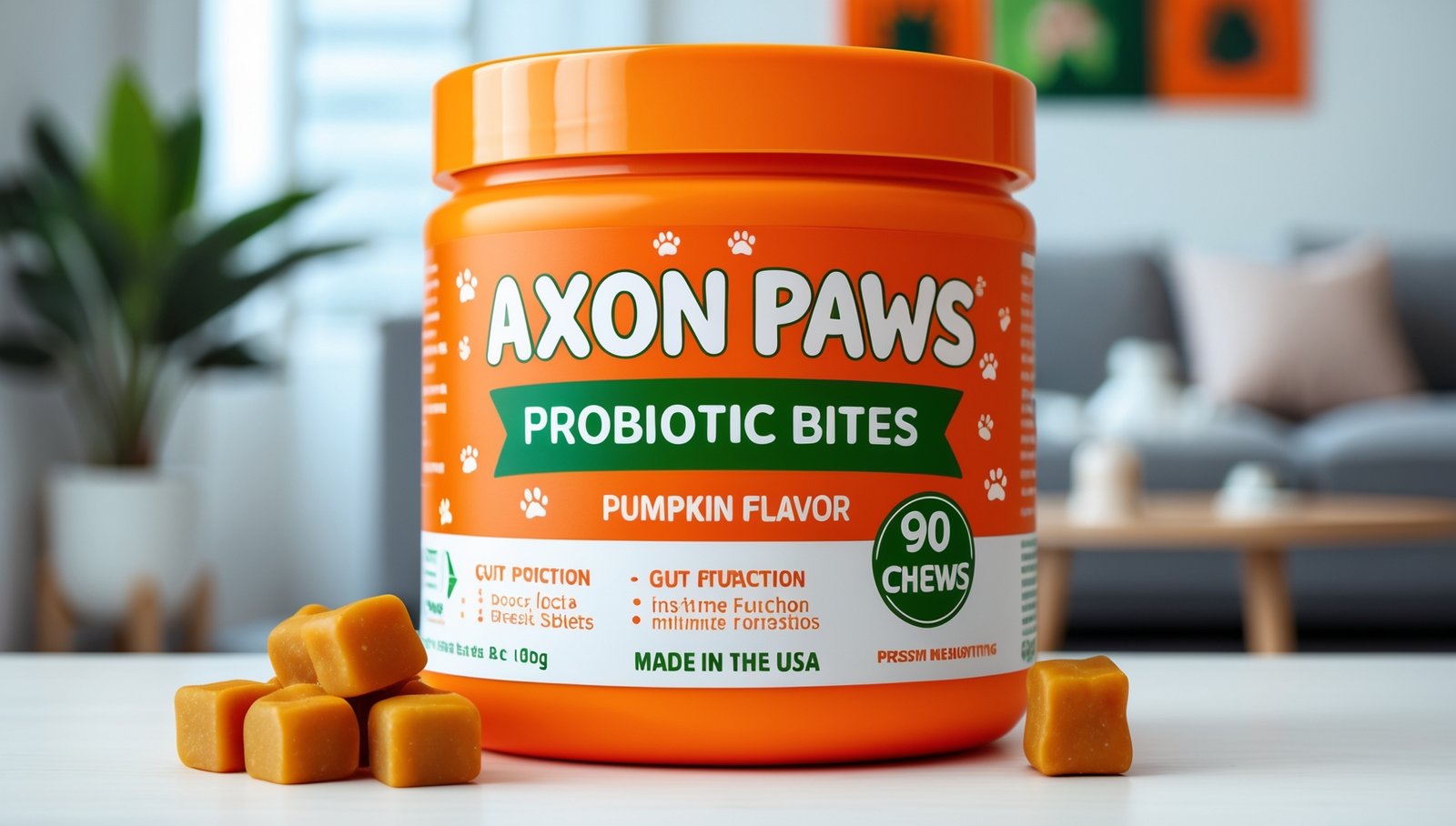Dogs of all ages can suffer from arthritis, a progressive joint disease that causes pain, stiffness, and reduced mobility. In fact, about 25% of dogs in the U.S. will develop some form of arthritis in their lifetime, and up to 80% of senior dogs show symptoms. While there is no cure for canine arthritis, a combination of veterinary care, weight management, and targeted joint supplements can greatly improve a dog’s comfort and quality of life. This guide covers the top 10 supplements for dogs with arthritis, explains what causes arthritis, how to recognize it, and how supplements can help. We also include key management tips and FAQs to help you make an informed choice.

Table of Contents
Causes of Arthritis in Dogs
Arthritis (often osteoarthritis) in dogs results from degeneration of joint cartilage, leading to inflammation and pain. It becomes more common with age due to normal wear-and-tear on the joints. Other factors that can trigger or accelerate arthritis include:
- Genetics and breed: Some breeds (especially large and giant breeds like Labrador Retrievers, German Shepherds, Golden Retrievers, Rottweilers, etc.) are genetically predisposed to joint problems such as hip and elbow dysplasia. These inherited conditions cause abnormal joint structure, which eventually wears down cartilage.
- Prior Injuries or Illness: Dogs that have had serious joint injuries (e.g. torn ligaments, fractures) or past joint infections can develop arthritis later on, as the damaged cartilage gradually degrades.
- Obesity: Carrying extra weight puts increased strain on all joints. Overweight dogs are much more likely to develop arthritis earlier because the joints must support greater force. Even a few extra pounds can accelerate cartilage wear.
- Lifestyle: High-impact activities (like frequent jumping, rough play, or hard-surface running) can stress joints and contribute to arthritis over time. Exposure to tick-borne diseases (e.g. Lyme disease) or metabolic disorders (like diabetes) can also inflame joints.
- Age: Simply growing older is a major risk factor. As dogs age, their bodies make less of the substances (like hyaluronic acid) needed to keep joints well-lubricated and cushioned.
Understanding these causes is important for prevention and early intervention. For example, keeping your dog lean and avoiding high-impact activities can help delay the onset of the top 10 supplements for dogs with arthritis.
Recognizing Arthritis in Dogs
Arthritis in dogs is a chronic, gradual disease. Early on, symptoms may be subtle or intermittent, so attentive pet parents are key. Watch for these common signs and symptoms of joint pain:
- Limping or Favoring a Leg: If your dog starts limping after exercise or “favors” one limb, it could indicate joint pain. Sudden limping or lameness after rest is a classic sign the top 10 supplements for dogs with arthritis.
- Stiffness, Especially After Rest: Older or arthritic dogs may take longer to get up after lying down, and you may hear joint creaks. Stiffness is often worst right after waking or after a nap.
- Reluctance to Play, Run, or Climb Stairs: A once-energetic dog that now hesitates to run, jump, or go upstairs may be avoiding pain. Many owners notice reduced enthusiasm for exercise or new “soreness” during activities.
- Behavioral Changes: Chronic pain can make dogs irritable, quiet, or “grouchy,” especially when touched near painful joints. You might notice them growling or snapping if their sore hips or knees are handled the top 10 supplements for dogs with arthritis.
- Muscle Loss (Atrophy): Over time, dogs with joint pain often lose muscle mass in the affected limbs because they use them less. You may see a slimmer rear end or weaker muscles in one leg the top 10 supplements for dogs with arthritis.
- Joint Licking or Biting: Dogs will sometimes lick or chew at a painful area. Red or brown saliva on a joint (e.g. the paw or hock) can be a clue.
- Worsening with Weather: Many dog owners notice their pets seem stiffer or sorer in cold, damp weather. This sensitivity to weather changes is common in arthritic joints the top 10 supplements for dogs with arthritis.
If you notice any of these changes (limping, slowed movement, or mood changes), it’s wise to consult your veterinarian. Early diagnosis helps manage pain and slows progression. Vets confirm arthritis via physical exams (checking joint flexibility and pain), X-rays to visualize cartilage loss, or other tests the top 10 supplements for dogs with arthritis.
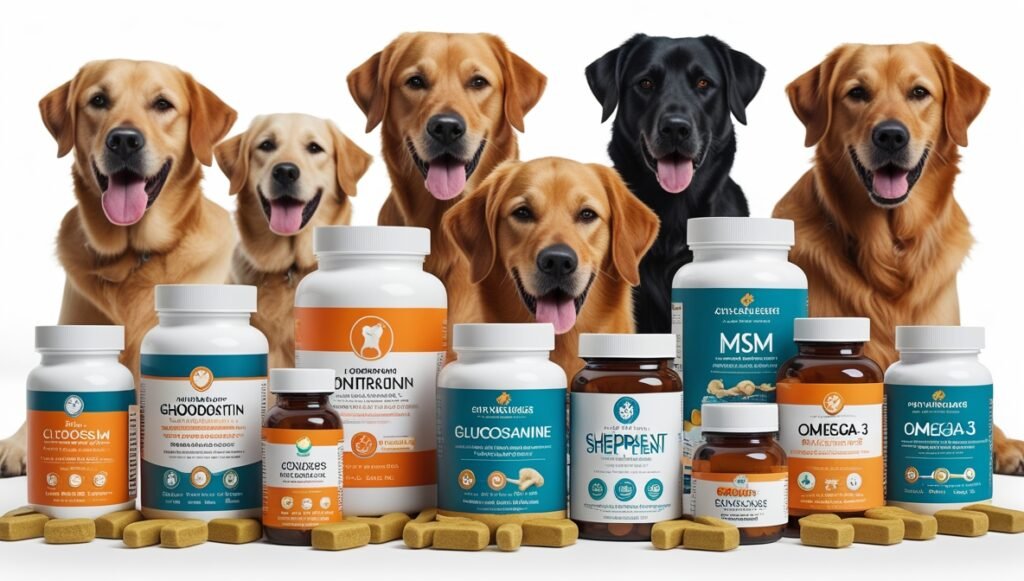
Managing Canine Osteoarthritis
Effectively managing arthritis typically requires a multi-faceted approach tailored to your dog’s needs. Key components include:
- Weight Management: Keeping your dog at a healthy weight is critical. Excess pounds dramatically increase pressure on all joints, accelerating cartilage wear. Even a 10% weight reduction can significantly ease pain. Feed a balanced diet and use portion control. Your vet can recommend a weight loss plan if needed.
- Exercise and Physical Therapy: Regular, gentle exercise keeps joints mobile and muscles strong. Low-impact activities like swimming or walking are ideal – swimming, for example, allows exercise without bearing full body weight. Short, frequent walks are better than long hikes. Physical therapy (like hydrotherapy or massage) can also improve flexibility and muscle tone around joints. Ensure exercise is controlled; avoid excessive jumping or twisting motions that can strain arthritic joints the top 10 supplements for dogs with arthritis.
- Pain Relief Medications: Veterinarians commonly use non-steroidal anti-inflammatory drugs (NSAIDs) or other pain medications to reduce inflammation and pain. These can provide significant relief, but often work best as part of a broader plan. NSAIDs should be used under vet supervision due to possible side effects, especially with long-term use the top 10 supplements for dogs with arthritis.
- Supplements: Joint supplements can be an important adjunct (see next section). Cornell University notes that most supplements are relatively safe and can be started in hopes of reducing the progression of osteoarthritis or its symptoms. Supplements often work best alongside medications and other therapies, rather than as a sole therapy the top 10 supplements for dogs with arthritis.
- Comfort and Environment: Make lifestyle adjustments to reduce strain on sore joints. Provide a soft orthopedic bed or padded resting area to cushion joints and keep your home warm (cold can stiffen arthritic joints). Use non-slip rugs or mats so your dog can walk without slipping. Ramps or steps can help large or small dogs access cars, beds, or couches without jumping.
- Other Therapies: In some cases, vets may recommend acupuncture, laser therapy, or even joint injections (like hyaluronic acid or PSGAG) to help arthritis. These treatments vary in efficacy by dog, but they can be discussed with your vet if standard measures aren’t enough.
By combining these approaches (medications for comfort, weight control to reduce strain, gentle exercise to maintain muscle, and supplements for joint support), most dogs with arthritis can enjoy a much happier, more mobile life the top 10 supplements for dogs with arthritis.
How Supplements Can Help for Dogs
While there’s no cure for arthritis, joint supplements target the disease in specific ways. According to Cornell’s canine health experts, supplements for arthritis “help rebuild cartilage and increase flexibility in the joint”, and many also contain anti-inflammatory ingredients. Some key points on supplements: the top 10 supplements for dogs with arthritis.
- Cartilage Support: Ingredients like glucosamine, chondroitin, and undenatured collagen provide the building blocks for cartilage repair. Glucosamine supports the formation of cartilage, while chondroitin helps cartilage retain water and block destructive enzymes. Cornell notes that adding undenatured type-II collagen (derived from chicken sternums) acts to prevent damage to cartilage. In effect, these nutrients may slow cartilage breakdown the top 10 supplements for dogs with arthritis.
- Inflammation Reduction: Many supplements include anti-inflammatory components. For example, omega-3 fatty acids (from fish oil) are well-known for blocking inflammatory compounds and easing joint swelling. Cornell specifically recommends fish oil for dogs with arthritis as it helps slow joint degeneration and may even allow a dog to take lower doses of NSAID medications. Other natural anti-inflammatories often found in supplements include MSM (a sulfur compound), turmeric (curcumin), green-lipped mussel extract, and Boswellia serrata. These ingredients reduce inflammation at the source, which can significantly ease a dog’s pain.
- Joint Lubrication: Some nutrients improve the joint’s “grease.” Hyaluronic acid, a component of normal joint fluid, helps cushion joints and reduce friction. Supplementing hyaluronic acid helps joints glide smoothly, easing stiffness. Other supplements (e.g. eggshell membrane) also contribute glycosaminoglycans that attract water into the joint.
- Overall Health and Comfort: In practice, many owners report that their dogs are happier and more active when taking joint supplements (often combined with other therapies). Cornell notes that “many owners report less discomfort and better quality of life” from such supplements. Omega-3s in particular are so effective that veterinarians use them to potentially reduce the necessary dose of NSAIDs the top 10 supplements for dogs with arthritis.
In short, joint supplements address arthritis by supporting cartilage health and reducing inflammation. They are considered safe for most dogs and can be started at any age (even prophylactically in high-risk dogs). However, it’s important to treat supplements like medications: follow dosing instructions carefully and keep them out of reach to prevent overdose. Always consult your veterinarian before starting any new supplement regimen, so they can ensure it’s safe and appropriate for your dog’s condition and existing treatments the top 10 supplements for dogs with arthritis.
Top 10 Joint Supplements for Dogs with Arthritis
Below are the 10 most effective supplement ingredients for supporting dogs’ joint health and managing arthritis. These are often found in commercial products or can be given individually (with vet approval). For each, we highlight its benefits, ideal use, and form factors.
- Glucosamine & Chondroitin. These two nutrients are a classic foundation of joint supplements. Both occur naturally in healthy cartilage and work together to maintain and repair it. Glucosamine serves as a “building block” for new cartilage, while chondroitin sulfate helps cartilage retain moisture and block enzymes that degrade joint tissue. Together they can reduce pain, slow cartilage breakdown, and improve mobility. Veterinarians often recommend them long-term since they are safe even for daily use. Glucosamine and chondroitin supplements come in many forms – tablets, soft chew treats, or liquids – making them easy to give even to picky eaters. Best for: dogs of any size with arthritis or hip/elbow dysplasia, especially older or large-breed dogs needing extra joint support the top 10 supplements for dogs with arthritis.
- Omega-3 Fatty Acids (Fish Oil). Omega-3s (EPA and DHA) are potent anti-inflammatory nutrients sourced from fish oil. They help block the pathways that produce joint inflammation and pain. As Cornell notes, we “recommend fish oil … [as] things that might help slow [arthritis] progression”. In practical terms, omega-3 supplements often reduce joint stiffness and swelling, making dogs more comfortable. They also support skin and coat health as a bonus. Omega-3s are typically given in liquid (oil) form or as capsules. Best for: virtually all dogs with arthritis; especially helpful for dogs already on pain meds (since fish oil may allow a lower NSAID dose). Large or active dogs may require higher doses the top 10 supplements for dogs with arthritis.
- Hyaluronic Acid. Hyaluronic acid (HA) is a natural component of normal joint fluid. Its main job is to lubricate and cushion the joints like oil in a car engine. As dogs age or develop arthritis, their natural HA levels drop, causing stiff, grinding joints. Supplementing HA helps joints “glide smoothly,” reducing pain and wear. Many owners find their dog moves more freely after adding HA. It comes in tablet or liquid form and is often combined with glucosamine or MSM for extra effect. Best for: dogs with arthritis or early joint degeneration, especially large breeds or seniors losing natural joint lubrication the top 10 supplements for dogs with arthritis.
- MSM (Methylsulfonylmethane). MSM is a sulfur-rich compound known for strong anti-inflammatory properties. It works by suppressing joint inflammation at the molecular level, which can significantly ease chronic pain. In addition, sulfur is vital for forming collagen and connective tissue. MSM can support the repair of cartilage and connective tissues around the joint. Many dog joint formulas include MSM along with glucosamine and chondroitin. It’s available as tablets, soft chews, or a flavorless powder that can be mixed into food. Best for: dogs of any age with arthritis or joint injury, especially older dogs with stiffness. It’s very safe (digestive upset is rare) the top 10 supplements for dogs with arthritis.
- Turmeric (Curcumin). Turmeric root contains the active ingredient curcumin, a natural compound with potent anti-inflammatory and antioxidant effects. Curcumin works by blocking inflammatory enzymes and cytokines, similar to how NSAIDs work, but from a plant source. Supplementing turmeric can reduce swelling and joint pain in arthritic dogs, often improving mobility. It also has antioxidant benefits that protect joint tissues over time. Turmeric is commonly given as capsules, tablets, or powders. It’s often paired with black pepper (piperine) or a fat (like coconut oil) to increase absorption. Best for: dogs with chronic inflammation or pain, and owners seeking a natural option. Note: High doses of curcumin can upset the stomach, so dosing should be cautious the top 10 supplements for dogs with arthritis.
- Vitamin C. Vitamin C is a powerful antioxidant that helps neutralize harmful free radicals in the body. It also plays a role in collagen production, which is essential for maintaining healthy cartilage. While dogs can make their own vitamin C, supplementing it can give extra joint support. Vitamin C may reduce inflammation and support overall joint resilience. It can help protect cartilage from oxidative damage and assist in healing. Vitamin C supplements come as chewable tablets or powders. Many joint supplement blends include moderate amounts of vitamin C for these reasons. Best for: aging or high-stress dogs that may benefit from extra antioxidant support, and for dogs who need a boost in collagen production the top 10 supplements for dogs with arthritis.
- Devil’s Claw. Devil’s Claw is an herbal extract from a plant native to Africa, long used to treat arthritis pain. Its active ingredients (harpagosides) have natural analgesic and anti-inflammatory effects. In dogs, Devil’s Claw may help reduce joint pain and stiffness, allowing sore dogs to walk more comfortably. It’s typically used as an alternative or complement to NSAIDs, especially in dogs who can’t tolerate strong drugs. You’ll find it in capsules, tablets, or liquid extracts. Because it can irritate the stomach, it’s best used under guidance. Best for: dogs with chronic arthritis pain, especially seniors, when pet owners prefer herbal support the top 10 supplements for dogs with arthritis.
- Boswellia Serrata. Also known as Indian frankincense, Boswellia is a powerful Ayurvedic anti-inflammatory. Its active boswellic acids block inflammatory enzymes, reducing swelling and pain in the joints. Studies in both people and animals show that Boswellia supplements can significantly improve pain scores and mobility in arthritis. Most dogs respond quickly (sometimes within weeks) to Boswellia supplementation. It comes as tablets, capsules, or powders. Best for: dogs needing rapid inflammation relief, including those with sensitive stomachs who may not tolerate NSAIDs well. Note: Boswellia can cause mild diarrhea at very high doses the top 10 supplements for dogs with arthritis.
- Green-Lipped Mussel (Perna canaliculus). Green-lipped mussel (GLM) extract is a marine superfood from New Zealand, uniquely rich in omega-3s, glucosamine, chondroitin, and other glycosaminoglycans. It provides comprehensive joint support: it naturally delivers building blocks for cartilage (glucosamine/chondroitin) and potent anti-inflammatories (omega-3s) in one package. Research and clinical studies confirm GLM’s benefits: it supports cartilage repair, lubricates joints, and reduces inflammation and pain in arthritic dogs. A common therapeutic dose is about 70–100 mg per kg of body weight per day. GLM supplements come in capsules or powders, and even in some premium treats or foods. Best for: dogs with moderate to severe arthritis (large breeds, seniors) needing a natural, high-bioavailability solution. Dogs allergic to shellfish should avoid GLM the top 10 supplements for dogs with arthritis.
- Collagen (including Undenatured Type II Collagen). Collagen is the main protein in cartilage and connective tissues. As dogs age, they produce less collagen, so supplementing can help rebuild joint structures. Undenatured type II collagen (UC-II) is a form of collagen that specifically targets immune responses in joints to prevent further cartilage damage. Regular collagen supplementation can support cartilage, tendons, and ligaments, improving joint strength and flexibility. It also benefits skin, coat, and nails, making it a “whole-body” supplement. Collagen is available as chewable tablets, powders (to mix into food), or natural sources like bone broth. Best for: senior dogs losing mobility, large breeds with hip problems, and any dog recovering from joint injury or surgery. Collagen is very safe, though introducing it gradually is wise to avoid digestive upset the top 10 supplements for dogs with arthritis.
Each of the above supplements plays a unique role, and often combining several of them yields the best results. For example, many joint formulas contain glucosamine + chondroitin + MSM + omega-3s in one pill. You’ll find these supplements in various forms – tablets, chews, powders, liquids – to suit different dogs. For picky eaters or small dogs, flavored chewable treats or liquid formulas can simplify dosing. For large breeds or severe arthritis, look for “extra strength” or higher-dose products. In all cases, choose veterinary-grade or well-reviewed brands the top 10 supplements for dogs with arthritis.
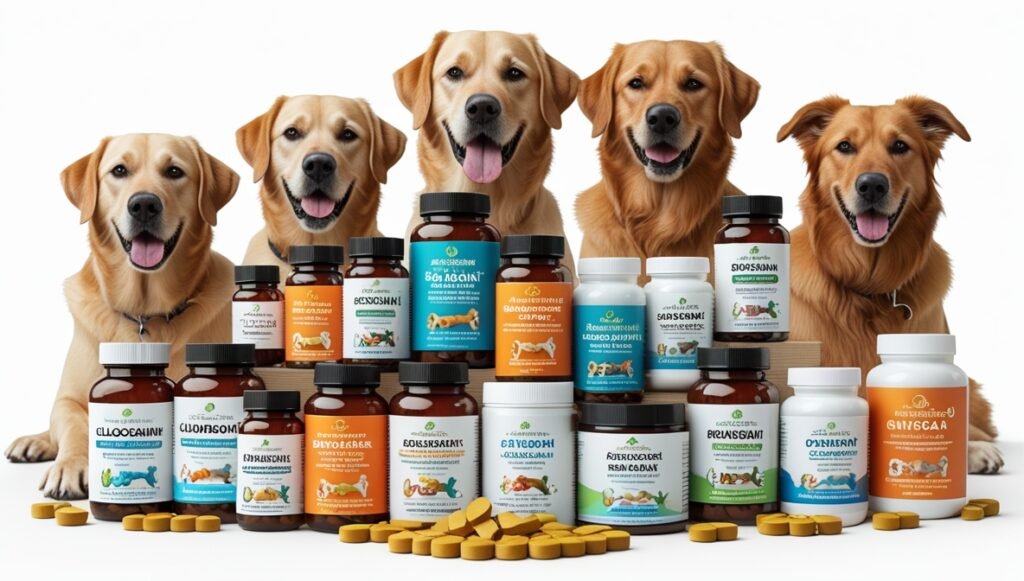
Choosing the Right Supplements
When selecting supplements for your dog’s arthritis, consider:
- Your Dog’s Profile: Age, size, breed, and activity level all matter. Large breeds or very active dogs may need higher doses or extra-strength formulas. Small breeds or senior dogs might prefer smaller tablets or flavored chews. Puppies and pregnant dogs have different needs – always ask your vet before giving supplements to very young or special-care dogs.
- Veterinarian Guidance: Always talk to your vet first. They can help diagnose the specific joint issue and recommend supplements that are safe and appropriate. Some ingredients might interact with medications or health conditions, so professional advice is crucial. Cornell experts emphasize discussing with a veterinarian before starting any supplement regimen.
- Quality and Dosage: Opt for high-quality, well-formulated supplements. Look for products from reputable manufacturers that state proven ingredient levels. Follow dosing instructions closely – underdosing may be ineffective, while overdosing (especially on fat-soluble vitamins or potent herbs) can cause problems. For example, although most joint supplements are safe, it is possible to overdose, so treat them like medicines the top 10 supplements for dogs with arthritis.
- Ingredient List: Check that key ingredients (like glucosamine, chondroitin, MSM, omega-3s, etc.) are clearly listed. For instance, many effective joint supplements for dogs include glucosamine + chondroitin together, sometimes with added MSM or turmeric for inflammation. Some products will also list green-lipped mussel, hyaluronic acid, or other goodies. Avoid products with filler ingredients and ensure each listed ingredient has a sufficient dose the top 10 supplements for dogs with arthritis.
- Form and Administration: Consider your dog’s preferences and feeding routine. Tablets and Chews: Easy to dose and often flavored. Good for dogs who will chew them the top 10 supplements for dogs with arthritis.
Liquid or Powder: Can be mixed into food or water. Ideal for picky dogs or multiple-dog households that need flexible dosing.
Soft Treats: Joint supplement “treats” are popular and well-accepted by most dogs. - Goal of Supplement: Some supplements (like omega-3 or antioxidants) are more “preventative” for joint health, while others (like green-lipped mussel or Boswellia) have faster pain-relief effects. Pick one that matches your goals: slowing progression vs. relieving current pain the top 10 supplements for dogs with arthritis.
Ultimately, a high-quality joint supplement can be a valuable part of your dog’s arthritis care plan. It’s best used in combination with other treatments like weight control, exercise, and any medications your vet prescribes the top 10 supplements for dogs with arthritis.
Other Ways to Manage Arthritis in Dogs
Beyond supplements, here are additional tips to keep your arthritic dog as comfortable and active as possible:
- Keep Active Safely: Gentle, regular activity maintains muscle tone. Try engaging activities like walking on grass (softer surface), swimming, or walking on sand. Always avoid slippery floors or excessive stairs. Shortening walks into several brief outings (instead of one long hike) can prevent excessive strain.
- Physical Therapies: Hydrotherapy (doggie pools or underwater treadmills) is excellent for dogs with joint pain, because the water supports body weight while muscles work. Massage, gentle stretching, and physiotherapy exercises can also improve joint range of motion. Consult a certified canine rehab therapist for guidance.
- Warm Compresses: Applying a warm (not hot) compress to stiff joints can ease pain before or after exercise. Cold packs can help when a joint is acutely inflamed or after very long activity the top 10 supplements for dogs with arthritis.
- Home Modifications: As mentioned, use ramps for cars/sofas, provide a draft-free, warm bed, and place food/water bowls at a comfortable height to avoid strain. Ensure there’s a non-slip surface for them to walk on (grippy mats or carpets).
- Nutrition: Feed a balanced diet appropriate for your dog’s life stage and condition. Some prescription or special “joint care” diets have added nutrients like omega-3s or antioxidants. Avoid free-feeding to prevent weight gain the top 10 supplements for dogs with arthritis.
By proactively managing weight, exercise, comfort, and diet, you can often slow arthritis progression significantly. Supplements complement these measures by directly supporting joint health and reducing pain.
FAQs
What causes arthritis in dogs? Arthritis is usually caused by wear-and-tear degeneration of joint cartilage as dogs age. Injuries (fractures or torn ligaments), joint infections, and genetic conditions (like hip dysplasia) can accelerate arthritis. Obesity is a major contributor, since extra weight strains the joints. Certain breeds (especially large breeds) are more prone due to inherited joint abnormalities the top 10 supplements for dogs with arthritis.
How can I tell if my dog has arthritis? Look for subtle changes in behavior or movement. Symptoms include limping or favoring a leg, stiffness after resting, reluctance to jump or climb stairs, and irritability when touched near joints. You may also see loss of muscle mass in hind legs or increased joint licking. An early vet check can confirm arthritis with a physical exam and X-rays the top 10 supplements for dogs with arthritis.
What supplements help dogs with arthritis? Supplements containing glucosamine, chondroitin, MSM, omega-3 fatty acids, hyaluronic acid, and green-lipped mussel are among the top joint-supportive products. These ingredients are scientifically shown to support cartilage repair, lubricate joints, and reduce inflammation. For example, glucosamine and chondroitin suppress inflammatory enzymes and help rebuild cartilage; omega-3 fish oil blocks inflammatory pathways; and green-lipped mussel provides a natural blend of glucosamine, chondroitin, and omega-3s to ease pain. Many joint supplements combine several of these ingredients for a broad effect. Always choose high-quality brands and ask your vet to recommend specific products the top 10 supplements for dogs with arthritis.
Are joint supplements safe, and do they replace veterinary treatment? In general, joint supplements are safe for most dogs. They are not a standalone cure, but rather part of a comprehensive treatment plan. The Guide Dogs UK site explicitly notes that “joint supplements should only be used as part of an overall treatment plan”. Supplements help reduce inflammation and support joints, but they usually work best alongside vet-prescribed medications (like NSAIDs) and weight/exercise management. Think of supplements as nutritional support – they complement but do not replace veterinary advice or other therapies the top 10 supplements for dogs with arthritis.
When should I start supplements for my dog? Many experts suggest starting joint supplements before severe arthritis sets in, especially for high-risk dogs. Cornell veterinarians note that some owners give joint supplements when a dog is around 1 year old (when growth plates close) as a preventative. Others wait until signs appear or until a vet recommends them. The key is to use supplements early enough to help but only after discussing with your vet. If you have an active dog or a breed prone to joint disease, adding a supplement (especially omega-3s) can be beneficial.
How long until I see improvements? Unlike painkillers, most joint supplements take time to work (weeks to a few months). Some dogs show changes in 4–6 weeks, while others may need 3+ months of regular use. Be patient and consistent. Meanwhile, continue all other management steps (weight control, exercise, meds) and follow up with your vet to assess progress the top 10 supplements for dogs with arthritis.
Can I give human joint supplements to my dog? Always be cautious. Many joint ingredients (glucosamine, chondroitin, omega-3) are the same in human and pet formulas, but dogs have different dosage requirements and flavors. Moreover, some human supplements contain xylitol or other additives toxic to dogs. It’s safer to use products specifically labeled for dogs. For example, “Cosequin” or “Dasuquin” are common vet-recommended brands made for dogs the top 10 supplements for dogs with arthritis.
What about joint supplements for cats? Yes, cats can also get arthritis (especially seniors) and there are feline-specific supplements (often glucosamine-based). However, feline biology differs, so never use a dog supplement on the top 10 supplements for dogs with arthritis a cat unless it’s specifically marked safe for cats. Always ask your vet about cat formulations if you have a cat with joint issues the top 10 supplements for dogs with arthritis.
In summary, the top 10 supplements for dogs with arthritis (glucosamine/chondroitin, omega-3s, hyaluronic acid, MSM, turmeric, vitamin C, devil’s claw, Boswellia, green-lipped mussel, and collagen) each play a role in reducing inflammation and supporting cartilage health. When combined with vet care, weight control, gentle exercise, and home comfort measures, these supplements can help your dog stay mobile and happy. Always consult your veterinarian to tailor the best plan for your dog’s the top 10 supplements for dogs with arthritis.

